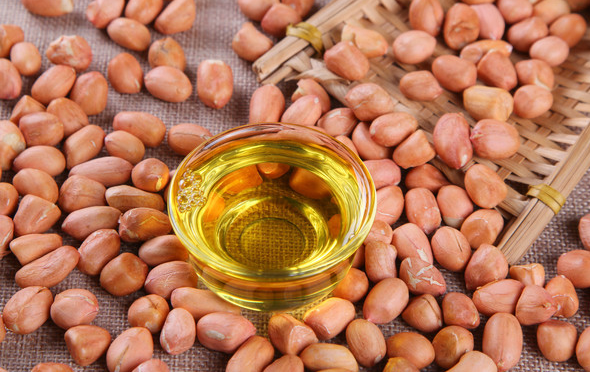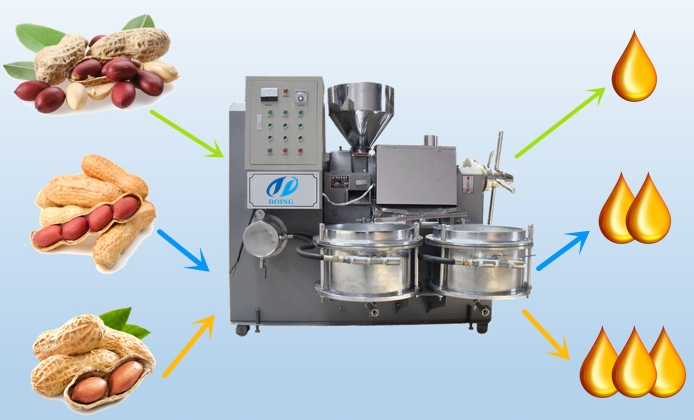Is it safe to press ground peanut oil? On the one hand, ground-squeezed peanut oil is widely favored by the masses because of its traditional "no additives" and "pure natural"; on the other hand, it may have a support crisis because it may contain aflatoxin B1 that exceeds the national standard, which has caused serious problems from all walks of life. pay attention to. Can aflatoxin B1 be removed and controlled during production and processing? What kind of peanut oil is safe to eat? The following is a detailed analysis of the safety of ground-squeezed peanut oil.

1. Soil squeezed peanut oil, can you still eat it
"Do-it-yourself, transparent process of freshly squeezed peanut oil, the raw materials are real materials, and there is no added, can you still eat it with peace of mind?" The survey found that at present, many consumers are worried about the peanut oil in the ground. The problem of excessive aflatoxin B1.
The peanuts are shelled and bagged after being purchased by the purchaser in the place of origin, and then transported by trains and cars to distant places for sale. From the purchase of peanuts to oil extraction, peanut kernels are stored and transported for a long time and many links. The environmental conditions are not easy to control, and peanuts are prone to mildew. In addition, the packaging bags used for these shelled peanuts are ordinary woven bags, which are ventilated and not sealed, and are extremely susceptible to changes in environmental temperature and humidity, which increase the chance of mildew. In this regard, in order to ensure the safety of edible oil, it is necessary to strictly monitor the safety of environmental conditions in the transportation and storage of raw materials.
At present, some consumers are worried that the incorporation of palm oil and soybean oil into peanut oil is harmful to human health. In fact, if these oils are mixed, if the test results meet the national food safety standards, they are safe to eat. But selling in the name of peanut oil is adulterated and deceived by consumers.

2. Can toxins in oil be removed
In fact, many of the quality problems of edible oil stem from the negligence of the manufacturer's production process, and these quality problems can be avoided.
Experts said that the current control of aflatoxin B1 can kill aflatoxin B1 in the "cradle" by taking corresponding measures to reduce and reduce pollution.
To reduce aflatoxin B1 in peanut oil, there are currently the following measures:
One is to control the moisture of raw materials. Suitable moisture is essential for the growth of Aspergillus flavus. When the water content of peanuts is below the safe water content (peanut kernels less than 8g/100g, peanut fruit less than 10g/100g), the chance of mold infection can be greatly reduced. Therefore, peanuts should be sun-dried, air-dried or dried immediately after harvest. Pay attention to the control of storage environmental conditions to ensure the safety of raw materials; you can also strictly control when purchasing raw materials, and speed up the reliability of purchasing qualified peanuts through the use of rapid testing methods.
The second is to change storage conditions. Peanuts should be stored in low-temperature and dry warehouses. Larger warehouses should be equipped with ventilation facilities. The temperature should be controlled below 18°C and the relative humidity of the air should be 40%-50%. In cloudy and rainy days and foggy days, the air humidity is high, and peanut seeds are easy to absorb water and become damp, and are infected by Aspergillus flavus to produce toxins. Therefore, the warehouse must be kept clean and dry, and storage methods such as sealing and adding desiccants can be used to ensure that the outside temperature and humidity changes do not affect the storage environment of peanuts. The use of composite polyethylene film bags to store peanuts can inhibit the growth and reproduction of molds by reducing the oxygen concentration and extend the storage period.
The third is to study and promote the application of new technology. Aflatoxin B1 has heat resistance, the pyrolysis temperature is 280℃, and the general cooking temperature cannot destroy it. The removal process of aflatoxin B1 in peanut oil has been relatively mature and has been widely used in some large edible oil production enterprises. It is understood that large-scale edible oil manufacturers generally take multiple measures to establish strict quality control procedures from procurement, storage, production, quality control, etc., and strictly follow the requirements of food safety standards for testing and supervision to eliminate Aspergillus flavus in the extracted peanut oil Toxin B1 exceeded the standard and achieved good results.
The supervisory authority stated that the peanut oil small workshops generally have weak technical strength, and mostly use the pressing method, the technical process is simple, and the effect of anti-mildew and detoxification measures is not good. Therefore, the development of facilities and equipment suitable for the removal of aflatoxin B1 in a small peanut oil workshop with strong operability, high efficiency and good application effect has become an urgent task in food safety.

3. Safe and assured oil, how to buy
The hazards in edible oil are difficult to visually detect. To ensure food safety, you should choose legally produced foods.
In this regard, consumers should pay attention to the following points when purchasing edible oil:
One is to buy peanut oil in large and medium-sized shopping malls, supermarkets, or food business stores with "Food Circulation License";
The second is to choose peanut oil with big brands, high credibility and good reputation;
Third, when purchasing pre-packaged peanut oil, choose products that clearly indicate the name, specification, and net content of the food, and have the "QS" mark on the label, and consume them within the shelf life;
Fourth, when buying bulk edible oil, choose products with food labels, marked with the name of the oil, the type of ingredients, the date of production, the shelf life, the manufacturer, the address, and the contact information;
Fifth, do not buy "three-no" peanut oil without production date, quality certificate (or production license), or manufacturer's name, and products that have expired or have incomplete packaging labels and obscure information.
If you want to learn about peanut oil extraction technology, please feel free to contact us.
Copyright © Henan Zhongxing Grain And Oil Machinery Co.,Ltd. All Rights Reserved. Powered by MetInfo